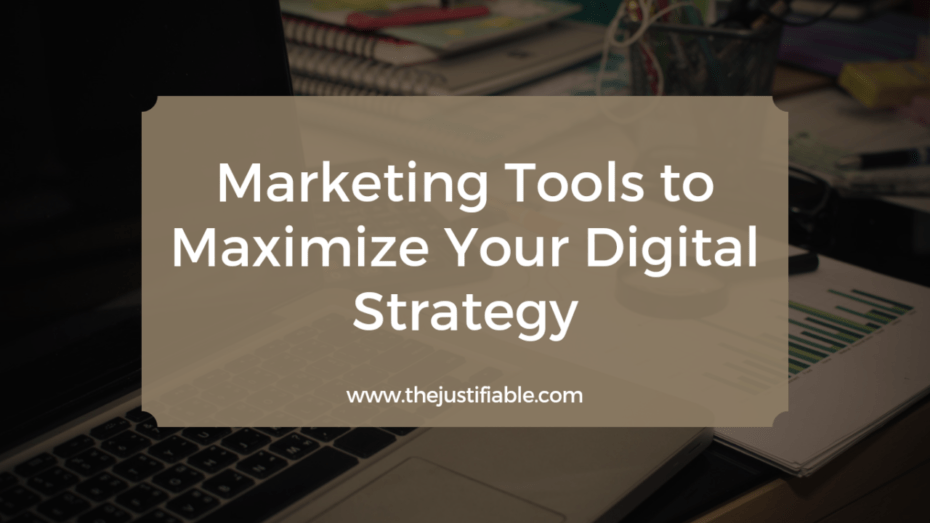Table of Contents
Marketing Tools to Maximize Your Digital Strategy! In today’s rapidly evolving digital world, businesses are finding it more crucial than ever to stay ahead of the game. And the key to gaining this competitive edge? The strategic use of marketing tools.
As we venture further into the digital era, marketing tools are not just handy extras anymore – they’re indispensable parts of a robust and result-driven digital strategy.
Marketing tools serve as a driving force behind effective online marketing. They have the potential to automate processes, optimize efforts, and more importantly, connect businesses with their target audiences in ways that were previously unimaginable.
Whether you’re a startup trying to make your mark or a well-established company aiming to maintain your competitive edge, understanding and utilizing these tools can be a real game-changer.
Understanding the Role of Marketing Tools in Digital Strategy
In today’s digital age, marketing tools and digital strategies are inextricably intertwined. The goal is not just to use the tools but to leverage them in a way that reinforces your digital strategy and helps you achieve your marketing objectives.
The Intersection of Marketing Tools and Digital Strategy
Marketing tools are the engines that power a successful digital strategy. They enable businesses to carry out marketing tactics effectively and provide a structured approach to achieve strategic objectives.
Whether it’s a tool designed for SEO, social media management, email marketing, or content creation, every one of these has a unique role in enhancing a brand’s digital strategy.
A well-rounded digital strategy not only outlines what you want to achieve but also identifies the tools that will help you get there. This intersection is where the magic happens, where data-driven insights meet strategic planning, and where businesses can truly connect with their audience in the digital sphere.
For example, SEO tools enable companies to understand how they’re ranking on search engines and what they can do to improve their visibility. Social media tools, on the other hand, allow businesses to manage their online presence, engage with their audience, and extend their reach.
Each tool, in its way, helps businesses implement, measure, and refine their digital strategies, maximizing their marketing efforts.
The Impact of Marketing Tools on Online Presence
In the current digital landscape, maintaining a strong online presence is paramount, and marketing tools play a significant role in achieving this. They aid in boosting your brand’s visibility, establishing a robust online reputation, and attracting more prospective customers.
SEO tools, for instance, optimize your website’s searchability, making it easier for potential customers to find you. Social media tools help you manage your brand’s persona on various platforms and engage with your audience more effectively.
Content creation tools assist in producing high-quality, SEO-optimized content that resonates with your audience, further enhancing your online presence.
Moreover, marketing tools allow for real-time analytics and reporting, providing businesses with valuable insights into their online performance. They enable companies to understand their audience’s behavior and preferences better, helping them fine-tune their strategies and deliver more personalized experiences, thus reinforcing their online presence.
The Benefits of Incorporating Marketing Tools into a Digital Strategy
Incorporating marketing tools into your digital strategy can have several benefits. Firstly, they streamline and automate tasks, reducing manual work, and improving efficiency. This allows businesses to focus more on strategic planning and less on operational tasks.
Secondly, marketing tools can help you gain a deeper understanding of your target audience. They provide valuable data about your audience’s behavior, preferences, and engagement, enabling you to tailor your marketing efforts to their needs.
Thirdly, marketing tools can significantly enhance your brand’s visibility and reach. They help optimize your website for search engines, manage your social media accounts, and create engaging, SEO-optimized content that attracts more traffic.
Finally, marketing tools offer measurable results. They provide detailed reports and analytics that enable businesses to track their performance, measure the success of their marketing efforts, and make data-driven decisions. This can lead to more effective marketing campaigns, better customer engagement, and ultimately, increased ROI.
Types of Marketing Tools to Enhance Digital Strategy
In the dynamic field of digital marketing, various types of tools can propel your strategy to new heights. Here, we delve into some of the critical categories of marketing tools that you can incorporate into your digital strategy to achieve your business goals.
SEO Tools
Search Engine Optimization (SEO) tools play a crucial role in enhancing your online visibility, helping your website rank higher in search engine results, and attracting more organic traffic.
They provide insights into keywords, backlinks, website health, and the competitive landscape, enabling you to optimize your website for both users and search engines.
SEO tools like SEOPowersuite, SEMRush, and Ahrefs help you uncover high-value keywords relevant to your business, enabling you to optimize your content and improve your search engine rankings.
These tools can also help you identify and rectify any technical issues that might be hampering your site’s performance, ensuring a smooth and enjoyable user experience.
Social Media Marketing Tools
In the era of digital connectivity, social media platforms are a gold mine for businesses, and the right tools can help you maximize this potential. Social media marketing tools allow you to manage your online presence across multiple platforms, schedule posts, engage with your audience, and monitor your brand’s reputation.
Tools like Buffer, Hootsuite, and Sprout Social help businesses create, schedule, and analyze social media content, saving time and ensuring a consistent brand message across all platforms. Additionally, they provide insightful analytics that can guide your social media strategy and help you understand what resonates with your audience.
Email Marketing Tools
Despite the rise of various digital communication channels, email remains a highly effective marketing medium. Email marketing tools can help you design captivating newsletters, segment your audience, personalize your messages, automate email campaigns, and track their performance.
Tools such as Stripo, Optinmonster, and Beefree are designed to make email marketing more efficient. They offer easy-to-use templates, A/B testing, detailed analytics, and automation features that can increase your email open rates and boost conversions.
Content Marketing Tools
Content is king in the digital marketing world, and content marketing tools can assist in creating, distributing, and measuring your content’s success. These tools can aid in content creation, keyword optimization, plagiarism checks, content scheduling, and more.
Tools like Quillbot, Grammarly, and CoSchedule help ensure your content is high-quality, SEO-friendly, and effectively managed. They enable you to create engaging, relevant content that resonates with your audience and drives traffic to your website.
Analytics and Reporting Tools
Understanding your marketing performance is essential for refining your strategy and making data-driven decisions. Analytics and reporting tools provide in-depth data on your website traffic, user behavior, campaign performance, and much more.
Tools such as Google Analytics, Tableau, and Looker can provide a wealth of data, from your website’s bounce rate to the conversion rate of a specific campaign. This valuable information allows you to measure the effectiveness of your marketing efforts and adjust your strategy as needed.
Deep Dive into Essential Marketing Tools
In the realm of digital marketing, certain tools have proven to be indispensable for businesses seeking to optimize their online presence and visibility. In this section, we’ll take an in-depth look into one of the most critical categories of these tools: SEO tools.
Overview of SEO Tools: Why They Matter
In the digital landscape, SEO (Search Engine Optimization) tools are no longer a luxury, but a necessity. They serve as the backbone of a successful digital strategy, helping businesses rank higher on search engine result pages (SERPs), thereby attracting more organic traffic.
SEO tools perform a wide range of functions that optimize a website for search engines. They provide insights into keywords, monitor backlinks, conduct site audits, analyze competitor performance, and much more. By revealing how a website is performing in terms of SEO, these tools allow businesses to tweak their strategies, fix issues, and improve their overall search visibility.
Keyword research is one of the fundamental functions of SEO tools. With tools like Google Keyword Planner or SEMrush, businesses can discover the most relevant keywords for their niche, understand their search volume, and even get a peek into what keywords their competitors are ranking for.
This insight enables businesses to craft content that aligns with what their target audience is searching for, enhancing their chances of appearing in top search results.
SEO tools also help monitor backlinks, which are a critical factor in how Google ranks web pages. Tools like Ahrefs provide insights into your backlink profile and your competitors’, helping you understand where your links are coming from and which links may be hurting your SEO.
Moreover, SEO tools assist in site audits, uncovering technical issues that may be affecting your site’s performance in SERPs. Whether it’s slow loading speed, broken links, or duplicate content, SEO tools can identify these problems, helping you resolve them and ensure a smoother user experience.
Why do SEO tools matter? In essence, they provide an opportunity to understand how your website interacts with search engines and users. By providing valuable data and insights, SEO tools guide your SEO strategy, helping you rank higher, attract more organic traffic, and ultimately, generate more leads and conversions. As such, they are an essential component of a comprehensive and successful digital strategy.
Social Media Marketing Tools: Boosting Your Brand Presence
Social media has become a crucial platform for businesses to engage with their customers, build brand awareness, and promote their products or services. With the average person spending over two hours a day on social media, businesses can’t afford to ignore its potential.
This is where social media marketing tools come into play, providing a way to optimize and streamline social media strategies, ultimately boosting your brand’s presence.
Social media marketing tools offer various functionalities, from scheduling posts and managing multiple accounts to monitoring engagement and analyzing performance. Tools like Buffer, Hootsuite, and Sprout Social allow businesses to manage their social media content across various platforms from a single dashboard. They help schedule posts for optimal times, ensuring your content reaches the maximum possible audience.
Besides scheduling and publishing, these tools also offer social listening and monitoring features. These functions enable businesses to keep their finger on the pulse of their brand sentiment, monitor mentions, and respond to comments or messages in real-time. It facilitates a more interactive and responsive brand presence on social media.
Furthermore, these tools provide invaluable analytics that give businesses insights into their audience’s demographics, interests, and engagement patterns. Understanding who your followers are, what content resonates with them, and when they are most active allows for the creation of more effective and targeted social media strategies.
But perhaps one of the most powerful aspects of social media marketing tools is their ability to aid in advertising on social media platforms. Tools such as Facebook’s Ad Manager can help businesses create targeted advertising campaigns, reaching a more specific audience and improving the chances of conversion.
By optimizing and automating social media management, these tools not only save time but also enhance your brand’s social media presence. They enable more consistent and engaging content, better customer interaction, and insightful analytics, all of which are key to a successful social media strategy. Thus, social media marketing tools play a vital role in boosting your brand presence in the ever-evolving digital landscape.
Email Marketing Tools: Optimizing Customer Communication
Even with the surge of numerous communication platforms, email remains an effective way for businesses to reach out to their customers. As such, email marketing tools are essential in any digital marketing toolkit. They aid in the creation, delivery, and analysis of email campaigns, helping businesses optimize communication with their audience and boost customer engagement.
Email marketing tools, such as Aweber, Omnisend, and Mailmunch, offer features that allow businesses to design aesthetically appealing and personalized emails. They provide a variety of templates that can be customized to reflect your brand image, ensuring a consistent look and feel across all your email communications.
Besides design, these tools also provide segmentation features. This allows businesses to divide their email lists into specific groups based on criteria like demographics, purchase history, or engagement levels. By doing so, businesses can tailor their message to each segment, leading to more relevant and personalized emails that are more likely to engage recipients.
Automation is another key feature of email marketing tools. It enables businesses to automate their email campaigns based on triggers or predetermined schedules. This could be anything from a welcome email series for new subscribers to a follow-up email after a purchase. Automating these processes not only saves time but also ensures that every customer interaction is timely and relevant.
Additionally, email marketing tools provide robust analytics that can track key metrics like open rates, click-through rates, and conversion rates. This data allows businesses to understand the effectiveness of their email campaigns, gain insights into subscriber behavior, and adjust their strategies for better results.
Ultimately, email marketing tools optimize customer communication by facilitating targeted, personalized, and timely interactions. They help businesses build strong relationships with their audience, enhance customer loyalty, and increase conversion rates. Thus, integrating email marketing tools into your digital strategy can significantly enhance your business’s growth and success in the digital space.
Content Marketing Tools: Creating and Distributing Value
In the realm of digital marketing, content is often considered king. It serves as the primary medium through which businesses communicate with their audience, showcase their value proposition, and establish authority in their industry. Content marketing tools, such as HubSpot’s CMS, Quillbot, and CoSchedule, assist businesses in creating valuable, relevant, and consistent content that resonates with their audience.
These tools streamline every stage of the content marketing process, from content creation and optimization to distribution and analysis. They offer features like editorial calendars for content planning, keyword research tools for SEO optimization, and social media integrations for easy content distribution.
For instance, Grammarly, a digital writing assistant, can help ensure your content is clear, engaging, and free of grammatical errors. HubSpot’s CMS, on the other hand, offers a comprehensive suite of tools that assist in content creation, optimization, and distribution, along with CRM integrations that help personalize content for different audience segments.
Moreover, content marketing tools often include analytics features that provide insights into how your content is performing. These insights can guide your content strategy, helping you understand what type of content resonates with your audience and what doesn’t.
Analytics and Reporting Tools: Measuring Success and Performance
In digital marketing, it’s not enough to just implement strategies; it’s equally important to measure their performance. Analytics and reporting tools provide in-depth data that help businesses understand the effectiveness of their marketing efforts and make data-driven decisions.
Google Analytics, Tableau, and Looker are examples of tools that offer powerful analytics capabilities. They provide a wealth of data, from your website’s traffic sources and user behavior to the performance of specific marketing campaigns.
Google Analytics, for instance, can help businesses track key metrics like website traffic, bounce rates, and conversion rates. It offers insights into how users interact with your website, which pages they visit, and what actions they take. This information can guide businesses in optimizing their website design, content, and user experience.
Tableau and Looker, on the other hand, offer advanced data visualization capabilities, making it easier for businesses to interpret their data and identify trends or patterns. They allow businesses to create customized reports and dashboards that align with their specific needs and goals.
Integrating Marketing Tools into Your Digital Strategy
To truly maximize the benefits of marketing tools, they need to be fully integrated into your digital strategy. This requires careful planning, clear goal setting, and continuous evaluation.
In this section, we’ll explore how to effectively incorporate these tools into your strategy, evaluate their effectiveness, and align them with your business objectives.
Steps to Incorporate Marketing Tools into Your Strategy
Incorporating marketing tools into your digital strategy is not a one-size-fits-all process; it requires an approach tailored to your specific business needs and goals. Here are some steps to guide this process:
- Understand Your Business Needs: Identify the areas where your business could benefit from marketing tools. Are you looking to improve your SEO, enhance your social media presence, or streamline your email marketing? Your business needs will guide your choice of tools.
- Research: Once you’ve identified your needs, conduct thorough research to find tools that meet these needs. Consider features, pricing, and reviews to make an informed decision.
- Test and Implement: Many tools offer free trials, allowing you to test them before making a commitment. Use this opportunity to see if the tool fits into your workflow and meets your expectations. If it does, begin incorporating it into your strategy.
- Train Your Team: Ensure your team understands how to use the new tool effectively. This may involve organizing training sessions or webinars, or making use of online resources.
- Monitor and Adjust: Once the tool is implemented, regularly check its performance and impact on your strategy. Be prepared to make adjustments as necessary.
How to Evaluate the Effectiveness of Your Chosen Marketing Tools
The effectiveness of your marketing tools should be assessed regularly to ensure they are contributing positively to your digital strategy. Metrics to consider when evaluating tools include ease of use, performance (in terms of meeting set objectives), cost-effectiveness, and impact on productivity.
Use the analytics provided by the tools themselves, coupled with external measures such as changes in web traffic, conversion rates, or social media engagement, to determine the tool’s effectiveness. If a tool is not meeting expectations or achieving its purpose, it may be necessary to seek an alternative.
Aligning Marketing Tools with Business Goals
Lastly, it’s crucial to ensure that your chosen marketing tools align with your overall business goals. Every tool you implement should serve a purpose that moves your business closer to its objectives, whether that’s increasing website traffic, improving customer engagement, or boosting sales.
Consider your key performance indicators (KPIs) and how these tools can help achieve them. For instance, if a key goal is to increase website traffic, SEO tools should be a key part of your strategy. If customer engagement is a primary focus, then social media and email marketing tools will be important.
By strategically integrating marketing tools into your digital strategy and regularly evaluating their effectiveness, you can optimize their value, making your digital marketing efforts more effective and efficient.
Case Studies: Successful Use of Marketing Tools
Marketing tools have played a pivotal role in the success of many businesses’ digital strategies. Let’s delve into a few case studies that showcase the transformative impact of various marketing tools when effectively implemented and managed.
SEO Tools: Case Study of a Company’s Successful Implementation
One shining example of a company that effectively leveraged SEO tools is Airbnb. They used Google’s SEO tools to boost their organic search visibility and drive more traffic to their website.
Through keyword research and optimization, they identified high-value keywords relevant to their business and incorporated them into their website content. Additionally, using SEO analytics, they continually monitored their website’s performance and made adjustments to improve their ranking in search results.
This strategic use of SEO tools has significantly increased Airbnb’s organic visibility, driving more traffic and conversions.
Social Media Marketing Tools: A Success Story
Coca-Cola’s #ShareACoke campaign is a brilliant example of the power of social media marketing tools. Leveraging platforms like Hootsuite for content scheduling and management, they rolled out a personalized marketing campaign across multiple social media platforms.
The campaign, which involved sharing images of Coca-Cola bottles with different names on them, prompted users to share these images with their friends and family, thereby enhancing the brand’s social media presence. As a result, Coca-Cola saw a significant increase in their social media engagement and brand recognition.
Email Marketing Tools: An Effective Campaign Example
E-commerce giant, Amazon, effectively utilizes email marketing tools like SendinBlue to automate and personalize their customer communication.
With automated emails tailored to user behavior (like cart abandonment reminders and personalized product recommendations), they have been able to significantly boost their conversion rates and customer engagement.
Content Marketing Tools: A Brand’s Journey to Increased Engagement
Red Bull is well known for its effective use of content marketing tools. Using platforms like WordPress for content creation and BuzzSumo for content research, Red Bull has been able to consistently produce and distribute high-quality, engaging content across their digital channels. This has resulted in a strong online presence, improved brand reputation, and increased audience engagement.
Analytics and Reporting Tools: Tracking Success in Real-time
Netflix’s use of data analytics and reporting tools is exemplary. Using tools like Tableau, they continually track and analyze user behavior and preferences. This data is then used to inform their content creation process, ensuring they provide content that resonates with their audience.
This data-driven approach has played a crucial role in Netflix’s success, enabling them to grow their user base and increase customer satisfaction.
These case studies highlight the transformative potential of marketing tools when effectively incorporated into a digital strategy. The common thread among these success stories is a strategic, informed approach to the use of marketing tools, underlining the importance of understanding and properly implementing these tools in your digital marketing efforts.
Future of Marketing Tools: What to Expect
As we navigate the digital landscape, it’s clear that marketing tools are evolving at a breakneck pace. They’re becoming smarter, more integrated, and more crucial to business success than ever before.
In this section, we will explore upcoming trends in marketing tools, how AI and Machine Learning are influencing these tools, and how you can adapt your digital strategy to make the most of these future developments.
Upcoming Trends in Marketing Tools
In the coming years, we can expect marketing tools to become even more integrated. Tools that encompass multiple aspects of digital marketing – SEO, social media, content creation, email marketing, and analytics – will become the norm. This integration will enable businesses to manage their digital strategy more efficiently, with insights from one aspect informing decisions in another.
We can also expect to see an increased emphasis on tools that prioritize user privacy. With growing awareness about data privacy and changes to regulations, marketing tools will need to adapt to ensure they respect user privacy while still delivering personalized experiences.
How AI and Machine Learning are Influencing Marketing Tools
Artificial Intelligence (AI) and Machine Learning (ML) are already reshaping the world of marketing tools. These technologies enable tools to analyze vast amounts of data quickly and accurately, providing insights and predictions that were previously impossible.
For instance, AI-powered SEO tools can analyze a website and provide precise recommendations for improving search rankings. ML can help email marketing tools segment audiences more accurately based on their behavior, thereby improving the effectiveness of marketing campaigns.
In the future, we can expect AI and ML to play an even bigger role in marketing tools, making them more efficient and effective, and offering a level of personalization that was previously unimaginable.
Adapting Your Digital Strategy to Future Marketing Tools
Adapting to the future of marketing tools involves staying informed about the latest trends, understanding the potential of AI and ML, and being willing to continually adjust your digital strategy as new tools and features become available.
It’s important to stay open to new possibilities, but also to be strategic in your adoption of new tools. Always consider how a new tool fits into your overall digital strategy and whether it will help you achieve your business objectives.
Furthermore, as user privacy becomes increasingly important, ensure that your use of marketing tools respects and protects user data. This will not only keep you in line with regulations, but will also build trust with your audience.
The future of marketing tools is exciting and full of potential. By staying informed, strategic, and adaptable, businesses can leverage these advancements to enhance their digital strategy and achieve greater success.
Conclusion: Maximizing Your Digital Strategy with Marketing Tools
In conclusion, marketing tools play an instrumental role in shaping a successful digital strategy. From enhancing online visibility with SEO tools, building brand presence with social media marketing tools, personalizing customer communication with email marketing tools, creating and distributing valuable content, to tracking success and performance with analytics tools – each plays a pivotal role in a comprehensive digital strategy.
It’s also important to stay abreast of the future of marketing tools. Trends such as increasing integration of tools, greater emphasis on user privacy, and the influential role of AI and ML are all key aspects to consider. Adapting your strategy to these emerging trends and advances can further strengthen your digital presence and ensure ongoing success.
At the end of the day, the successful implementation of these marketing tools is not about chasing the latest trend or having the most advanced technology. Rather, it is about understanding how these tools can support your business objectives, meet your audience’s needs, and provide value.
By keeping your focus on these principles, you can make informed decisions about which tools to use and how to use them, ultimately creating a digital strategy that is not only effective but also resilient and adaptable to change.
The world of digital marketing is vast and ever-changing. But with the right marketing tools at your disposal and a clear understanding of how to use them, you can navigate this landscape with confidence, and drive your business towards greater digital success.






